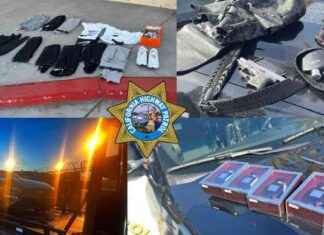The postponement of the presidential election continues to outrage the population. Senegal plunged into crisis on Saturday February 10 after the repression of demonstrations during which two young men were killed.
The repression sparked a wave of opposition protests. “We call the regional and international community to witness, in the face of the excesses of this dying power” of President Macky Sall, reacted Khalifa Sall, one of the main presidential candidates. Thierno Alassane Sall, another candidate, protested on X against the “unacceptable brutal repression.”
The country was deeply moved by the death in the historic city of Saint-Louis (North) of Alpha Yoro Tounkara, 22, a second-year geography student. Hundreds of students from Gaston-Berger University, where he studied, kept vigil overnight from Friday to Saturday, praying for him.
“He was not only a brilliant student, but also a loved and respected fellow student. His warm presence and contagious enthusiasm will be missed by all those who were lucky enough to know him,” wrote Cheikh Ahmadou Bamba Diouf, president of the university’s geography club.
The circumstances of his death are not yet known but an investigation has been opened, announced the Saint-Louis public prosecutor. The Minister of the Interior affirmed in a press release “that the defense and security forces did not intervene on the university campus where the death occurred”.
At least five journalists targeted
Modou Gueye, 23, was the second victim of the protests. He was a street vendor in Colobane, a bustling district of Dakar, where he sold jerseys and flags. “There were tear gas grenades fired, and then we went to the Colobane TER station to return,” his brother, Dame Gueye, told Agence France-Presse (AFP).
“It was there that a gendarme shot him with a live bullet in the stomach,” he said. “I was the one who held his bag when he fell,” he said. “He underwent two operations last night, and unfortunately he succumbed to his injuries this morning,” Mbagnick Ndiaye, his brother-in-law, told AFP. The information has not been confirmed by the authorities. Images posted on social networks raise fears that there are many injured.
On Friday, large-scale demonstrations against the postponement of the elections and the president, Macky Sall, took place across the country, but they were immediately dispersed by security forces. In Dakar, the capital, the police used abundant tear gas to keep away people who were trying to gather near the Place de la Nation. Protesters responded by throwing stones and erecting barricades with makeshift objects. Reporters Without Borders was “outraged” on Friday by the fact that at least five journalists were targeted by police in Dakar.
The call to protest on Friday was broadcast on social networks, without it being possible to determine precisely who was behind it. Such protests are generally banned in the country.
New demonstration planned for Tuesday
Senegal has been regularly shaken since 2021 by episodes of protest linked to legal proceedings against one of the main opponents, Ousmane Sonko, now in prison. Dozens of people were killed there, and hundreds arrested.
This new episode of unrest opens a period of uncertainty in the country a week after Macky Sall’s announcement of the indefinite postponement of the presidential election, initially scheduled for February 25.
The National Assembly on Monday approved a postponement until December 15, after forcibly expelling opposition deputies. She also voted to keep Mr. Sall in power until his successor takes office, likely in early 2025. His second term officially expired on April 2.
This postponement, which Macky Sall justifies by invoking a dispute between Parliament and the courts regarding certain candidacies, has sparked indignation widely shared on social networks. The opposition calls for a “constitutional coup”. Senegal’s international partners have expressed their concern and called for elections to be held as quickly as possible.
A new protest launched by a civil society collective, Aar Sunu Election (“Let’s protect our election”), is planned for Tuesday. Faced with repression, “we need a strategy of citizen struggle. Civil disobedience is a weapon that we will use to bring this country to a standstill and restore constitutional legality,” Malick Diop, one of the coordinators of the collective, told AFP on Saturday.
On Friday, walkouts in schools were massively followed and imams were invited to denounce the political situation in their preaching during the big prayer.
The postponement of the presidential election is seen by the opposition as a scheme to avoid the defeat of the candidate of the presidential camp, or even to keep the current president at the head of the country for several more years, which he denies. Faced with one of the most serious political crises in recent decades, Mr. Sall said he wanted to initiate a process of “appeasement and reconciliation”.





